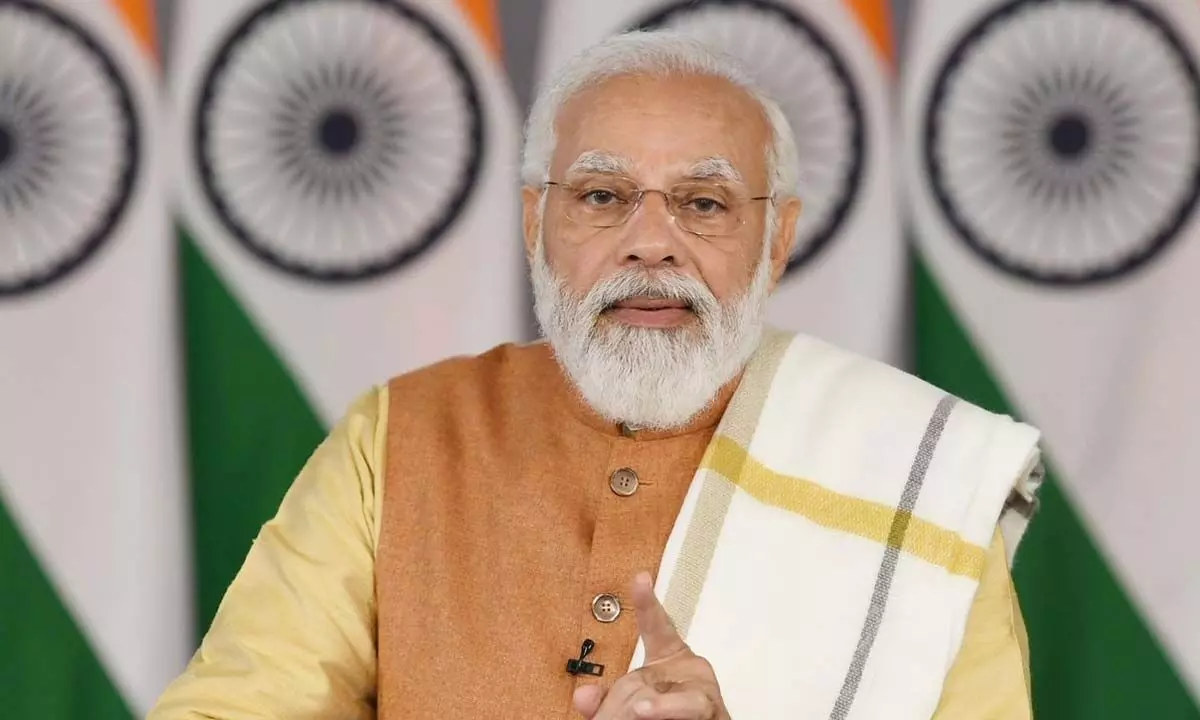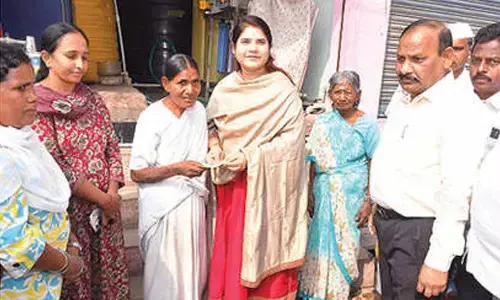Prime Minister Modi set to take a giant step to achieve Mission Kashmir

Prime Minister Narendra Modi (Photo/IANS)
With his frequent visits to Jammu and Kashmir, Prime Minister Narendra Modi has created a record of sorts.
New Delhi: With his frequent visits to Jammu and Kashmir, Prime Minister Narendra Modi has created a record of sorts. If his scheduled visit of 24 April 2022 materialises, he will become Indias first PM after 1980 to have visited J&K as many as 21 times.
Modi is known to have toured Kashmir in the thick of militancy in 1990-94. According to the local BJP leaders, he visited all the valley's six districts in 1993 when most of the mainstream politicians had resigned under the fear and diktat of gun. Former Chief Minister Farooq Abdullah had escaped to London. Several of his ex-Ministers and MLAs had been killed by terrorists and others�with exceptions like Aga Syed Mehmood, Mohammad Shafi Bhat and Mohammad Sayeed Akhoon�had migrated and settled in Jammu.
Mufti Mohammad Sayeed, who worked as the union Home minister for 11 months in 1989-90, used to live in Delhi. Ghulam Nabi Azad, another former Union Minister from J&K, had reduced his visibility after his brother-in-law was kidnapped and, for his good luck, released. Farooq Abdullah couldn't even visit the funeral of his close relative Sheikh Sadiq, reportedly killed by Mushtaq Latram's Al-Umar Mujahideen.
A year after hoisting the Indian national flag along with the then BJP President Murli Manohar Joshi and other party colleagues at Lalchowk, Modi traversed the length and breadth of the militant-infested valley. His subsequent low-key visits lent him an unmatched confidence. At his Lalkar Rally at Jammu's M.A. Stadium, on 1 December 2013, when he was Gujarat's Chief Minister and the BJP's Prime Ministerial candidate, Modi made a mention of his long-time association with J&K.
Touring border areas, addressing public rallies, inaugurating projects, laying foundation stones and presiding over high-level official meetings, Modi visited J&K as Prime Minister as many as 20 times from his first visit on 4 July 2014 to his last on 4 November 2021. In a single year, most of his J&K visits happened in the year 2014�4 July, 12 August, 7 September, 23 October, 22 November, 28 November, 8 December, 13 December and 16 December.
In 2015, Modi visited J&K three times�on 1 March, 17 July and 7 November. His one-odd visit in 2016�on 19 April�covered the inauguration of a sports complex besides the convocation of Mata Vaishno Devi University and inauguration of Mata Vaishno Devi Hospital at Katra in Jammu.
In 2017, Modi visited J&K twice, first on 2 April to inaugurate the Syama Prasad Mukherjee tunnel between Nashri and Chenani on the Srinagar-Jammu highway. Later, on 19 October, he visited the Gurez valley on the Line of Control. On 19 May 2018, he had an extensive visit to Ladakh, Kashmir and Jammu.
On 3 February 2019, just 11 days before the deadly Pulwama blast which killed 44 CRPF personnel, PM Modi had another extensive visit to Srinagar, Leh and Jammu. His last civilian and political visit happened on 14 April 2019 when he addressed the Lok Sabha election rallies at Kathua and Udhampur.
After reorganisation of the erstwhile State and withdrawal of special status in August 2019, Modi visited J&K only twice�on 27 October 2019 and 4 November 2021, both times to celebrate Diwali with the troops in Jammu's Rajouri district.
While the authorities are tight-lipped on the PM's Kashmir itinerary, Palli Panchayat in Jammu's Samba district is being decorated for a massive public rally. The BJP leaders insist that one lakh people would attend Modi's first public meeting in J&K after the creation of the Union Territory. Among other programmes, PM is scheduled to lay the foundation stone for three major hydroelectric power projects on the Chenab river virtually at his public meeting. He would also kickstart projects involving a national and foreign investment worth Rs 70,000 crore under the UT's new Industrial Development Policy.
Officials in Srinagar are making preparations to mobilise a large number of the members and heads of Panchayati Raj Institutions and Urban Local Bodies for participation in Prime Minister's second public meeting at Sher-e-Kashmir International Conference Centre (SKICC). His attendance at a sports event inside a stadium is also on cards.
This time around Modi is visiting J&K when preparations are underway for the UT's first Assembly elections. The delimitation process, which began in March 2020, is likely to be completed within its current deadline of 6 May. Both PM and the Union Home Minister Amit Shah have maintained that the elections would be held immediately after completion of the delimitation process. There has been no State/UT legislature or public representation since November 2018.
However, holding of the Assembly elections would heavily depend on the security scenario. Even as the Police and security forces have neutralised over 600 militants in the last three years, an upswing in the incidents of terrorist violence since 19 March 2022 is not encouraging for a democratic process.
Similarly, the separatists' soft power has not been neutralised decisively as both radicalisation and recruitment of guerrilla cadres is still intact. Authorities claim to be working on a fresh policy to deal with the so-called hybrid militants and over-ground workers (OGWs) but the peoples' engagement with the government, particularly with the Police and security forces, is still minimal. This continues to be Modi's biggest challenge in J&K after August 2019.
In the midst of a political vacuum exists a sizable constituency of optimism which expects Modi to deliver on his promise of �Naya Kashmir'.
A visible developmental revolution like a grid of the four-lane road connectivity linking all districts in Kashmir and Jammu regions, connecting schools and colleges through a network of smart classrooms, upgradation of services at all hospitals, supply of uninterrupted power and drinking water, a big employment package and regularisation of the services of contractual and need-based staff could break the jinx of alienation, disappointment and cynicism in the post-2019 Jammu and Kashmir.














